Buy Local Buy Social Empower Your Community – Our second Enterprise Fair at the Park Ecovillage Findhorn.
The Enterprise Fair 2025, held at the Universal Hall in The Park Ecovillage at Findhorn, was a celebration of regenerative enterprise, social innovation, and community resilience. The Fair, the second annual event building on the success of the first one in 2024, aimed to highlight local entrepreneurship while fostering a broader, global conversation on sustainability and ethical business.
This event was a vibrant showcase of the pioneering spirit of the Park Ecovillage Findhorn Community as well as the phenomenal creativity and entrepreneurship in the local area.
We celebrate that this year, the Fair expanded in several ways:
- it burst beyond the Universal Hall to several locations in the Park Ecovillage
- several enterprises from the local area came to exhibit alongside Community based ventures
- we launched the Enterprise Directory
- we started a global Facebook group and offered an online event with live streaming and interactive virtual components, allowing for global participation and engagement.
Event Overview and Purpose
The core purpose of the Enterprise Fair is to celebrate and support the diverse enterprises that have grown up within and around the Park Ecovillage, as well as in the local area. It serves as a platform for local makers, creators, and business owners to showcase their work, fostering connections between producers and consumers. The event’s theme Buy Local Buy Social Empower Your Community underscored the Fair’s commitment to demonstrating how local, grassroots initiatives can contribute to global solutions for a resilient and regenerative future.
The Fair transformed the Universal Hall, and several other zones around the Park Ecovillage, into a hive of activity throughout the day.

The Opening Session
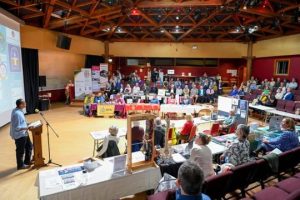 The day was opened by Fasil Bogale with an overview and welcome. In his introduction he reminded us of the ‘leaky bucket’ representing resources drained from the local area when we buy from non-local businesses.
The day was opened by Fasil Bogale with an overview and welcome. In his introduction he reminded us of the ‘leaky bucket’ representing resources drained from the local area when we buy from non-local businesses.
He was followed by two keynote speakers who provided invaluable insights into the themes of regenerative design, post-growth economics, and social enterprise.
Ariane Burgess, Member of the Scottish Parliament for Highlands and Islands, is a passionate advocate for community-driven land reform and social enterprise. Her talk focused on her work in regenerative design and policy innovation, providing a political and social context for the Fair’s themes.
Donnie Maclurcan, Findhorn Fellow and Co-founder of the Post Growth Institute spoke about “Connecting the Local to the Global: the power of what you already know and are doing”. He explored how existing knowledge and local actions can create powerful, transformative change on a global scale. His presentation challenged traditional economic models and highlighted the importance of a post-growth perspective in building a sustainable future.
Click on the arrow for more details of each presentation and the video recording.
Opening by Fasil Bogale
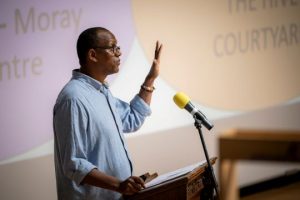 Fasil opened the Fair by welcoming everyone and celebrating the event’s significant growth. He announced that the Fair had more than doubled in size since last year, with 44 stalls across six different zones and in four locations, representing a diverse range of organisations from sole traders to charities.
Fasil opened the Fair by welcoming everyone and celebrating the event’s significant growth. He announced that the Fair had more than doubled in size since last year, with 44 stalls across six different zones and in four locations, representing a diverse range of organisations from sole traders to charities.
He defined the Fair’s purpose as providing a platform for these busy organisations to connect with the community and showcase their work. He noted the addition of a new feature this year: a livestream that allowed online participants from around the world to join the event, extending its reach beyond the local area.
 He introduced the Fair’s theme, Buy Local Buy Social Empower Your Community, by referring to Jonathan Dawson’s keynote at the opening of the Enterprise Fair 2024, and explaining the “leaky bucket theory.” He described the local economy as a bucket where money flows in from various sources like wages, tourism, and grants. The “leakage” occurs when money is spent on goods and services from national chains or imported products, causing it to leave the local economy. Fasil stressed that the goal should be to reduce this leakage rather than simply seeking more outside income. To illustrate the point, he used the example of spending £10 at a local independent café versus a national chain. He explained that the money spent at the local café would circulate and “multiply” within the community, generating an estimated £26 of economic activity, whereas the same amount spent at a national chain would only generate £11. He concluded by urging both individuals and businesses to become “multipliers” by consciously supporting local suppliers, volunteering, and spreading the word. He also announced the creation of an online Enterprise Directory to make it easier for people to find and support local businesses.
He introduced the Fair’s theme, Buy Local Buy Social Empower Your Community, by referring to Jonathan Dawson’s keynote at the opening of the Enterprise Fair 2024, and explaining the “leaky bucket theory.” He described the local economy as a bucket where money flows in from various sources like wages, tourism, and grants. The “leakage” occurs when money is spent on goods and services from national chains or imported products, causing it to leave the local economy. Fasil stressed that the goal should be to reduce this leakage rather than simply seeking more outside income. To illustrate the point, he used the example of spending £10 at a local independent café versus a national chain. He explained that the money spent at the local café would circulate and “multiply” within the community, generating an estimated £26 of economic activity, whereas the same amount spent at a national chain would only generate £11. He concluded by urging both individuals and businesses to become “multipliers” by consciously supporting local suppliers, volunteering, and spreading the word. He also announced the creation of an online Enterprise Directory to make it easier for people to find and support local businesses.
Ariane Burgess, MSP: A Blueprint for Community Resilience
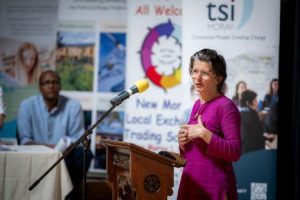 As our local Member of the Scottish Parliament Ariane commended the Ecovillage Findhorn Community as a model for regenerative design and community resilience.
As our local Member of the Scottish Parliament Ariane commended the Ecovillage Findhorn Community as a model for regenerative design and community resilience.
She began by sharing recent data from a social enterprise census, noting that 33% of social enterprises in Scotland are based in rural areas like the Highlands and Islands, where they contribute significantly to the economy and create jobs that pay above the national average wage.
Ariane’s core message was a call to remove the systemic barriers that prevent communities from replicating Ecovillage Findhorn’s success. She identified four key “blocks”:
- Access to land: She noted that land is often priced out of reach or tied up in slow bureaucratic processes, preventing communities from developing housing or growing food.
- Restrictive funding: She criticised the current system of short-term grants with confusing criteria and extensive reporting, which she said exhausts community members and stifles long-term planning.
- Outdated rules: She argued that current laws and procurement systems are built for large-scale, profit-driven entities and often fail to support circular, values-driven enterprises.
- Distant power: She highlighted the disempowering effect of decisions being made far away from the communities they affect.
Ariane celebrated the Ecovillage Findhorn Community for having already overcome many of these challenges through innovative models like its community land trusts and cooperative investment schemes. She concluded by stating that her work in parliament, including efforts on the Land Reform Bill and the Community Wealth Building Bill, aims to “remove the friction” from these systems, empowering other communities to build their own resilient futures.
Donnie Maclurcan: The Intuitive Wisdom of a Post-Growth Economy
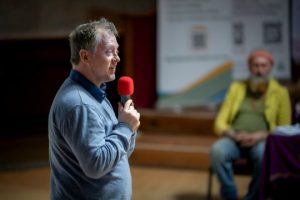 Donnie Maclurcan, Findhorn Fellow and co-founder of the Post Growth Institute, used an interactive experiment to illustrate his core argument. He asked the audience to draw a symbol representing a future economy that works for everyone and a symbol for the present economy. He revealed that across cultures and demographics, people consistently draw symbols of circularity, spirals, and hearts for the future, and jagged lines, downward arrows, and squares for the present. This, he argued, demonstrates a deep, intuitive human knowledge that healthy systems, whether in nature or the human body, are based on circulation and flow, while linear, extractive systems lead to collapse.
Donnie Maclurcan, Findhorn Fellow and co-founder of the Post Growth Institute, used an interactive experiment to illustrate his core argument. He asked the audience to draw a symbol representing a future economy that works for everyone and a symbol for the present economy. He revealed that across cultures and demographics, people consistently draw symbols of circularity, spirals, and hearts for the future, and jagged lines, downward arrows, and squares for the present. This, he argued, demonstrates a deep, intuitive human knowledge that healthy systems, whether in nature or the human body, are based on circulation and flow, while linear, extractive systems lead to collapse.
Donnie asserted that while the global, linear economy is in a state of cascading collapse, local communities are building the models that will sustain them. He shared two powerful anecdotes to support this: first, his experience in Argentina, where a sophisticated informal economy and banking system discounts for local purchases allow communities to thrive despite high national poverty. Second, he told the moving story of the women of Rwanda after the genocide, who chose to trade at local marketplaces and maintain their community, even though they knew their husbands may have killed each other. He concluded that “the future is local” and that this intuitive, community-based resilience is what will see people through the challenges to come.
Showcasing local enterprises: Exhibition, Marketplace and Activities
This year the Fair burst beyond the Universal Hall and gave those attending a sense of several vibrant venues in the Ecovillage. Each location had its own flavour and there were many scheduled activities to attend in addition to the 45 stalls by local entrepreneurs, environmental practitioners, and community leaders.
The “Kids” zone also provided nature games and craft activities, allowing parents a break to fully explore the Fair.
Enterprise Directory and videos
 In addition to the Enterprise Directory entries entrepreneurs were invited to send in a short video.
In addition to the Enterprise Directory entries entrepreneurs were invited to send in a short video.
We created a compilation which was shown throughout the day and also during the online event. The video opens with a powerful endorsement of our event by Pam Gregory, well-known astrologer and teacher and ends with a journey through the history of Forres, our local market town.
Click on the arrow for Pam Gregory’s astrological perspective: The Age of Community
One of our wonderful volunteers, Helena Matos, had the inspiration to ask Pam Gregory for an endorsement of the Enterprise Fair and we were surprised by her prompt and enthusiastic response. Pam offered a macro-level context for the themes of the event as she explained that the world is moving into the “Age of Aquarius,” which is fundamentally linked to community, collaboration, and grassroots action. She drew a historical parallel to the last time Pluto was in Aquarius (1777-1798), a period that saw the French Revolution, the storming of the Bastille, and the beheading of the monarchy. She noted that this period witnessed a shift from top-down authority to a new era where ordinary people came together to start small farms and artisan businesses, leading to the birth of a middle class.
Pam Gregory believes a similar “shift of power to the people” is happening now, with a global movement towards localised networks of intelligence and support. She cited examples such as “stand in the park” groups and the formation of intentional communities that buy land to grow food and share resources. This movement is seen as a collective, heart-based network that will create the future. Pam concluded that the focus will become “local rather than global,” as communities rely on each other for support, and that this age is a fundamental birthing of community.
We are deeply grateful to Pam and also to Helena Matos who had approached her for this endorsement.
The video below is a recording of a session when Alex Walker joined the online participants for a Q&A session after they had watched the compilation video.
Honouring Lifecycles of Organisations: The Entrepreneurial Journey
Organisations, like any being, go through cycles – beginnings, transitions, and endings. Entrepreneurs shared with each other their lived experience, exploring the different stages with appreciation and compassion, allowing us to learn and support more effectively those who serve us all with their dedication, creativity, and hard work.
The following word clouds seeded the atmosphere for the personal sharings of
Beginnings Transitions Endings
Click on the arrow for an introduction to this part of the event given by Marilyn Hamilton to the online audience.
Marilyn explored the different stages and shared examples from her own experience. As a speaker with a varied global background and eight years of experience living in the Park Ecovillage Findhorn, her work focuses on the development of individuals, leaders, teams, and communities. She uses a framework she developed called Integral City Thinking, which views human settlements as complex, living systems. She explained that these systems, much like the fractals of which they are composed, all follow similar patterns of growth, often described as forming, storming, norming, and performing.
Marilyn remembered her work with Scott Peck’s organisation, the Foundation for Community Encouragement. Peck’s work involved using circle dialogue to help build community. Over time, the organisation’s facilitators realised that while they were successful in working with specific communities, public workshops were much more difficult and less effective. Ultimately, the board decided the organisation was no longer successful and had to close.
Instead of simply ending operations, the foundation chose to hold a wake to honour its work and allow its members to grieve the loss. This three-day event, attended by 150-200 people, taught Marilyn that organisations, like people, have life cycles. She referenced Ichak Adizes and his book Corporate Lifecycles, which suggests that organisations are born, mature, and eventually decline if they are not renewed. She explained that a proper and graceful ending allows for a regenerative process, releasing energy for new beginnings.
Then two other participants shared their own experiences. Helena, from Portugal, spoke about closing a school she founded. She said she was deeply moved by the idea of an organisational lifecycle, as she realised her school’s growth and eventual ending mirrored the stages of her own children’s lives. She expressed gratitude for the insight, which helped her understand the grief she had felt but couldn’t previously articulate, and the importance of honouring the past while moving forward.
Sue, also from Portugal, shared her experience with Reeconomia, a local currency and community initiative that lost momentum during the COVID-19 pandemic. She spoke of her grief over the initiative’s decline and her uncertainty about what comes next. Marilyn reflected that a period of decline is part of a natural cycle, like autumn, which is a time for pause and regeneration before a new season can begin. She stressed the importance of not rushing into something new and allowing time to mourn and reflect.
Click on the arrow for a recording of the session in the Universal Hall and a summary.
Beginnings – The Leap of Faith: Ann McEllin, from the accountancy practice “Ways to Make It Count,” spoke about her personal journey into entrepreneurship after 30 years of working for others. She shared that it was the first time she truly understood the personal and financial risks involved. She noted that a new business must be started “wholeheartedly” and that a crucial milestone is simply surviving the first 18 months.
Transitions – The Turbulent Flow: This segment featured entrepreneurs navigating the challenges of change. John Talbott of Cullerne House described the “scary” transition from a community “rescue mission” to a sustainable business that must now repay its 50+ angel investors. Campbell and George Goudsmit of AES Solar discussed the management buyout that saw Campbell become a “custodian” of the company, while George expressed the personal difficulty of stepping back from a business he founded. Tim Slack of NFD spoke candidly about the “unsettling” process of an organisation splitting into two separate ventures while trying to “emancipate” staff to take on new accountability. Eian Smith of Duneland Ltd shared a story of a long transition that has brought “richness” and a new “road map” for winding down the company. Jonathan Caddy of Findhorn Hinterland Trust discussed his planned, multi-year transition, highlighting the importance of handing over the “spirit” and “ethos” of an organisation to the next generation.
Endings – Releasing Attachment and Creating Space: The final part of the session explored the emotional and practical aspects of endings. Lee Kelly, who sold his accountancy business after 20 years, shared that the process was emotionally challenging but a “natural conclusion.” Kathy Tyler from the Findhorn Foundation Trust described the profound grief and “wondrous experience” of winding down the trust, with a deep desire to preserve its legacy. Fasil Bogale spoke about the “relief” of ending his coffee business, Greenbridge Organics, after realising his personal “attachment” was causing the business to “limp along” and become a drain. He celebrated the business’s legacy: creating a community of coffee lovers who appreciate quality. Tim Slack concluded by sharing his personal view of the perfect ending, stating that it is when you “walk away, no one notices” because the organisation is thriving on its own.
The 2nd Ekopia Lifetime Achievement Award
 A key highlight of the Fair was the presentation of the Ekopia Lifetime Achievement Award 2025. This award was launched in 2024 to recognise an individual whose work has significantly advanced regenerative development and social resilience within the community. The award ceremony underscored the Fair’s commitment to honouring long-term contributions by dedicated individuals who have been pillars of the local economy.
A key highlight of the Fair was the presentation of the Ekopia Lifetime Achievement Award 2025. This award was launched in 2024 to recognise an individual whose work has significantly advanced regenerative development and social resilience within the community. The award ceremony underscored the Fair’s commitment to honouring long-term contributions by dedicated individuals who have been pillars of the local economy.
The recipient of the Ekopia Lifetime Achievement Award 2025 was Alex Walker. Mary Inglis and Judy McAllister gave the award presentation summarising Alex’s contribution to the Community and further afield.
Click the arrow for the recording of the award presentation
The presentation slides:
Local and Global Engagement
The Enterprise Fair was designed to be a highly interactive and engaging experience. For the first time, the Fair’s live streaming and virtual components allowed a worldwide audience to participate. “Roving reporters” provided real-time coverage and interviews, and online breakout rooms facilitated deeper discussions and networking. This dual-format approach successfully bridged the gap between the local and global communities.
Conclusion
The Enterprise Fair 2025 at The Park Ecovillage at Findhorn was a resounding success, demonstrating the enduring vitality and innovative spirit of the Community and the vibrant local area. It not only served as a marketplace for local businesses but also as a powerful forum for sharing ideas, building connections, and inspiring action toward a more sustainable and regenerative future.
The event’s endeavour to integrate in-person and online participation, coupled with its focus on celebrating both established and emerging enterprises, solidified its role as a crucial event for the Park Ecovillage Findhorn Community, a link to the global community connected to the Ecovillage and a model for sustainable development worldwide.
***
Credits: A big thank you to Mark Richards of Aurora Imaging for the photographs, and to Alex Wright of Flying Mirrors for the videos.

Ekopia is a co-operative located in Findhorn, Moray raising funds to support local community social enterprises. Founded in 2001, we are part of the Ecovillage associated with the Findhorn Foundation. We work closely with a variety of local stakeholders several of whom are represented on the Board.













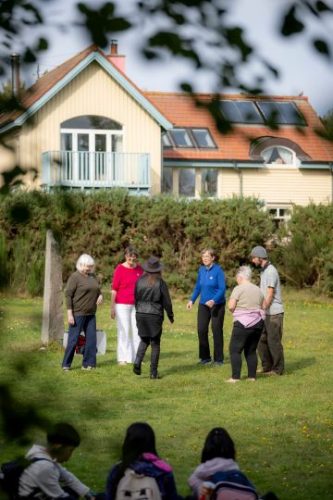



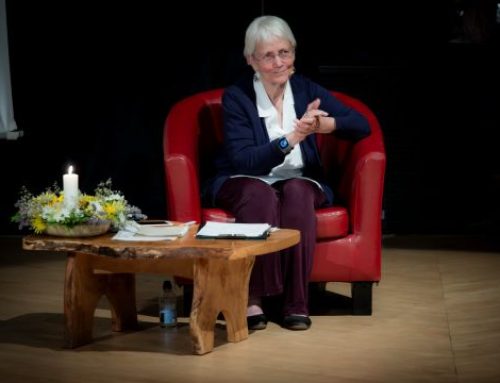

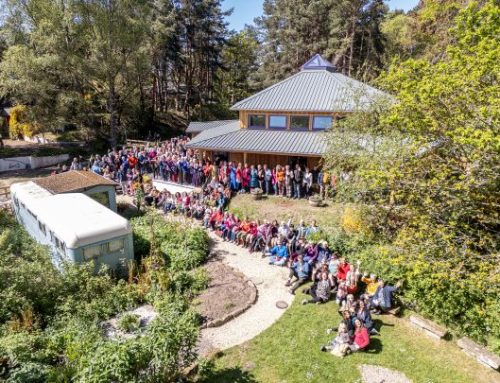
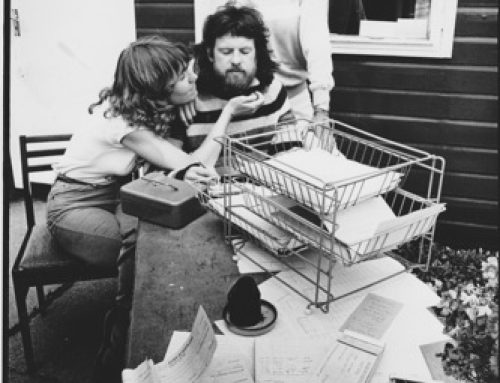




Leave A Comment